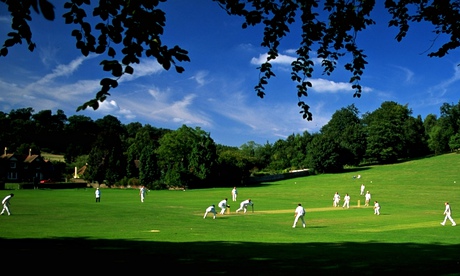
If, like me, horror is your reaction to lying on a beach with sand in all your crevices and wobbly bits on display as you attract the attentions the local insect population, then you need a seaside read to take you away from your current hell.
Angela Thirkell's August Folly instantly transports me to a golden summer day between the wars. It's not too hot, perfect cardigan weather, and on a verdant lawn that undulates down to a brook, beautiful young people in spotless white outfits play croquet until the gong signals that its time to dress for dinner. It's that kind of novel.
Written in 1936, August Folly is set in the bucolic village of Worsted where loads of posh upper middle class folk have descended for the summer. There's Mr and Mrs Tebben, a civil servant and writer of boring textbooks respectively, and their offspring: Margaret, back in England after a year in Grenoble being "finished" and her brother Richard, just down from Oxford. Richard is infatuated with the glamorous Rachel Dean, mother of nine brilliant and bratty children, who are staying at the nearby Dower House.
Alas, their plans for an idyllic summer are derailed by local busybody Mrs Palmer who bullies most of the village into taking part in a staging of Hippolytus in a barn.
It's not a typical beach read. This is no taut psychological thriller. There are no murders and absolutely no sex. The moments of high drama include Richard Tebbens triumphing at the village cricket match, the Tebbens' cook unable to cater for a dinner party as she's been railroaded into making costumes for the play, and Jessica, one of the smallest, most brattish Deans, coming within snorting distance of an ornery bull called Rushwater Rubicon.
Thirkell's particular gift is for getting to the heart of a character in one clever, wicked sentence. Mr Moxon, the obnoxious curate and scoutmaster, is "a breezy young man with a great belief in words, especially his own" and the querulous Mrs Phipps is "a born cook only in the sense that she had brought up a large family chiefly on tinned foods". Though she's compared to both Nancy Mitford and Barbara Pym, I find her far less brittle than the former and way less churchy than the latter.
August Folly is one of her Barsetshire novels, of which High Rising is the best known. They are delightful studies of an English way of life long gone, if it ever really existed. The aspirations of the upper middle classes are gently but firmly mocked and the fetlock-tugging lower orders know their place.
At the end of August Folly all wrongs have been righted, Hippolytus plays to a packed house and young lovers have been reconciled and reunited. I'm left with the same "aaaaah" of pleasant satisfaction that comes from taking the first sip of a perfectly brewed cup of tea.
• Sarra Manning's latest YA novel, The Worst Girlfriend In The World, is out now.

